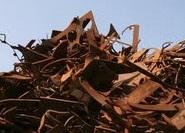Overseas

October 7, 2014
Asian Scrap Prices Impacted by Chinese Billet Exports
Written by Damon Sun
Below is an article on the Asian scrap markets from one of our contributing writers, Damon Sun of Daido International.
The last few weeks were chaotic in the markets.
Most Asian countries look to Taiwan for indications on market directions and a base for pricing. With the rapid decrease in prices in iron ore (abt $78/dmt), and the severe overcapacity in China (approx 300 million mt), the Chinese mills have been very aggressive in exports of billets to Taiwan, Vietnam, and as far as Turkey.
The influence on scrap prices have been extremely dramatic with a fall of $53/mt in a span of 2 weeks (containerized). Bulk scrap demand has been very subdued with a recent sale by Pacific Northwest Metals to Hyundai at $356/mt cfr Korea. This sale is considered high priced. Containerized to Taiwan has been at $300/mt cfr while S.E. Asia for example is at $290/mt cfr.
There is a new norm with prices basing and settling at a much lower level than the last few years. Influences will be based on dollar exchange rates and iron ore prices.
There is a simple calculation, and whether it holds true or not remains to be seen.
Iron Ore at 78/dmt x 3.5 = 273/mt for scrap equivalent.
Billets offered to Taiwan = $416/mt – $20/mt freight = $396/mt FAS China – $120 =$276/mt scrap equivalent.
So we may see scrap settle in the $275/mt range as long as iron ore prices remain subdued at these levels.
This week, some major steel mills lobbied the Taiwan government concerning the illegal imports of billets into Taiwan (approx 220KMT representing more than 50% of the imported scrap demand). The customs officials in Taiwan this week announced they will require that the export declarations from China and the import declarations in Taiwan , the commodity descriptions must match.
This is important as the commodity China exports is square bars boron added vs imported as steel billets. China has been exporting billets as square bars with boron added to receive a tax rebate (abt 8%). This should have a temporary stop gag measure on imports at lower prices into Taiwan.
Also heard this week that China will be eliminating all tax rebates on exports of steel for 2015. Therefore, we may see some stability from these price erosions going into 2015.
I will not go into iron ore miners and their insistence to expand and continue flooding the markets with iron ore. It is a strategy that remains to be seen if successful. In the meantime, ferrous scrap prices will settle at a new normalized levels likely down $80/mt from previous levels the last 5 years. Scrap demand also likely will be down 25% over in Asia for the next few years as well.
One note, this note is all about raw material prices. Finished product prices have so far fallen only about 50 percent of the amount of the raw material price fall. That is only about $26/mt drop vs $53/mt drop in scrap prices.





